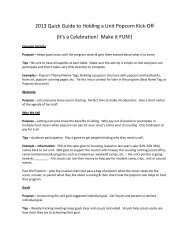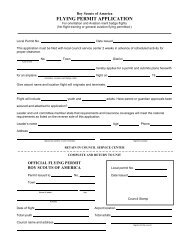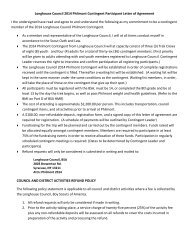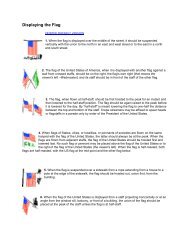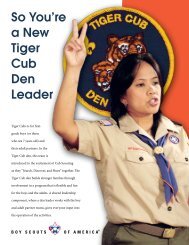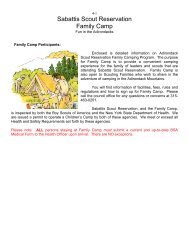Camps
Camps
Camps
You also want an ePaper? Increase the reach of your titles
YUMPU automatically turns print PDFs into web optimized ePapers that Google loves.
1 - 18<br />
Medications <br />
In order to comply with New York State Health Department<br />
Regulations, all troop medications must be stored in a locked<br />
box under control of the Health Director, his/her staff or<br />
designated person such as a responsible troop leader. All<br />
medications must be labeled. A troop medication list, Form<br />
C-4 (in the appendix) is used listing one Scout and one<br />
medication per line. The list will be kept in the locked boxes<br />
with the medications. Lock boxes will be issued to the troop<br />
leader when they come to camp. They will include a lock, key and seven medication lists.<br />
These lists should be filled out with the Scout’s name, medication and time of<br />
administration. If this is done when you receive the forms, you just have to verity the<br />
medication with the sheet when giving it. At the end of each week, the locked medication<br />
box, lock and key will be signed back into the camp office before departure from camp.<br />
Only those medications brought to camp by the Scout may be given. No Tylenol or other<br />
nonprescription medication will be given without contacting the Health Lodge first. New<br />
York State Health Department requires that a doctor authorize any medication given to a<br />
Scout. Use form H-1 for this approval.<br />
Camp Site Fire Protection<br />
Use 2 quart milk cartons, juice cans or #10 cans for fire<br />
buckets. Put 2 at each tent and fire site. Two full fire buckets <br />
are required by state law at each tent and we require two at each <br />
lean-‐to. It is up to the leaders to see that they are not used for<br />
other than the intended purposes. The buckets should be filled<br />
with clean water daily as part of the troop campsite cleanup<br />
procedures.<br />
1) Fire Control – It is recognized that fire buckets have no value for a large fire.<br />
However, they are of great value in stopping a small fire from becoming a<br />
large fire, or for putting out minor fires.<br />
2) First Aid – First aid for first and second degree burns is to apply cold water.<br />
When you have fire buckets, you have cold water there for prompt first aid.<br />
Note that in case of burns, time counts. The longer between burning and the<br />
application of cold water, the more possibility there is of damage or the<br />
greater the possibility of a more severe burn.<br />
3) Cooking – Handfuls of water may be thrown on a fire that is too hot.<br />
4) All fires are to be tended at all times. No fire is to be left burning in a<br />
campsite when there are no campers or leaders attending.<br />
5) Never build a fire directly on the ground at camp. The pine duff on the<br />
ground will catch and may burn hundreds of acres of land.



